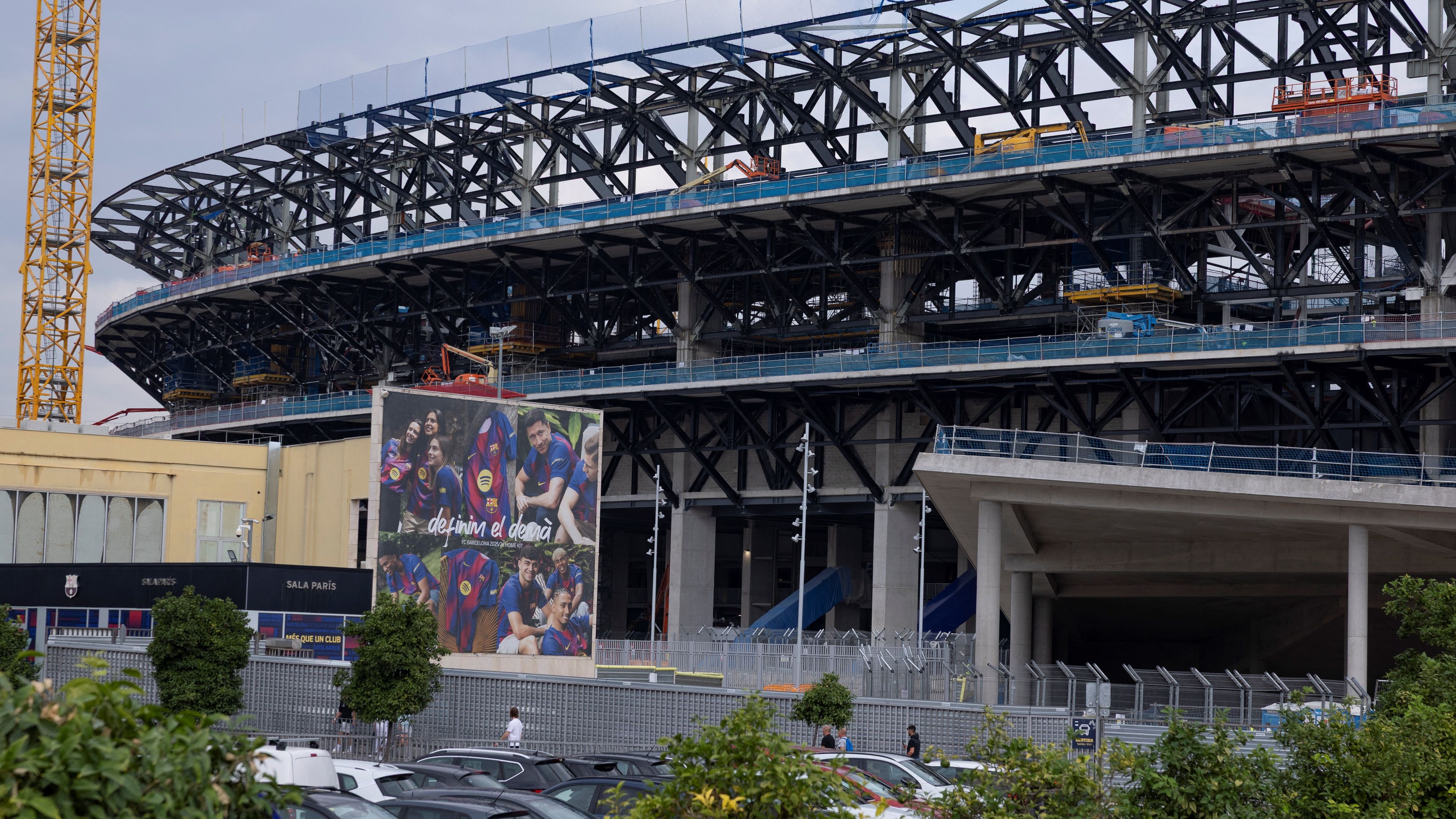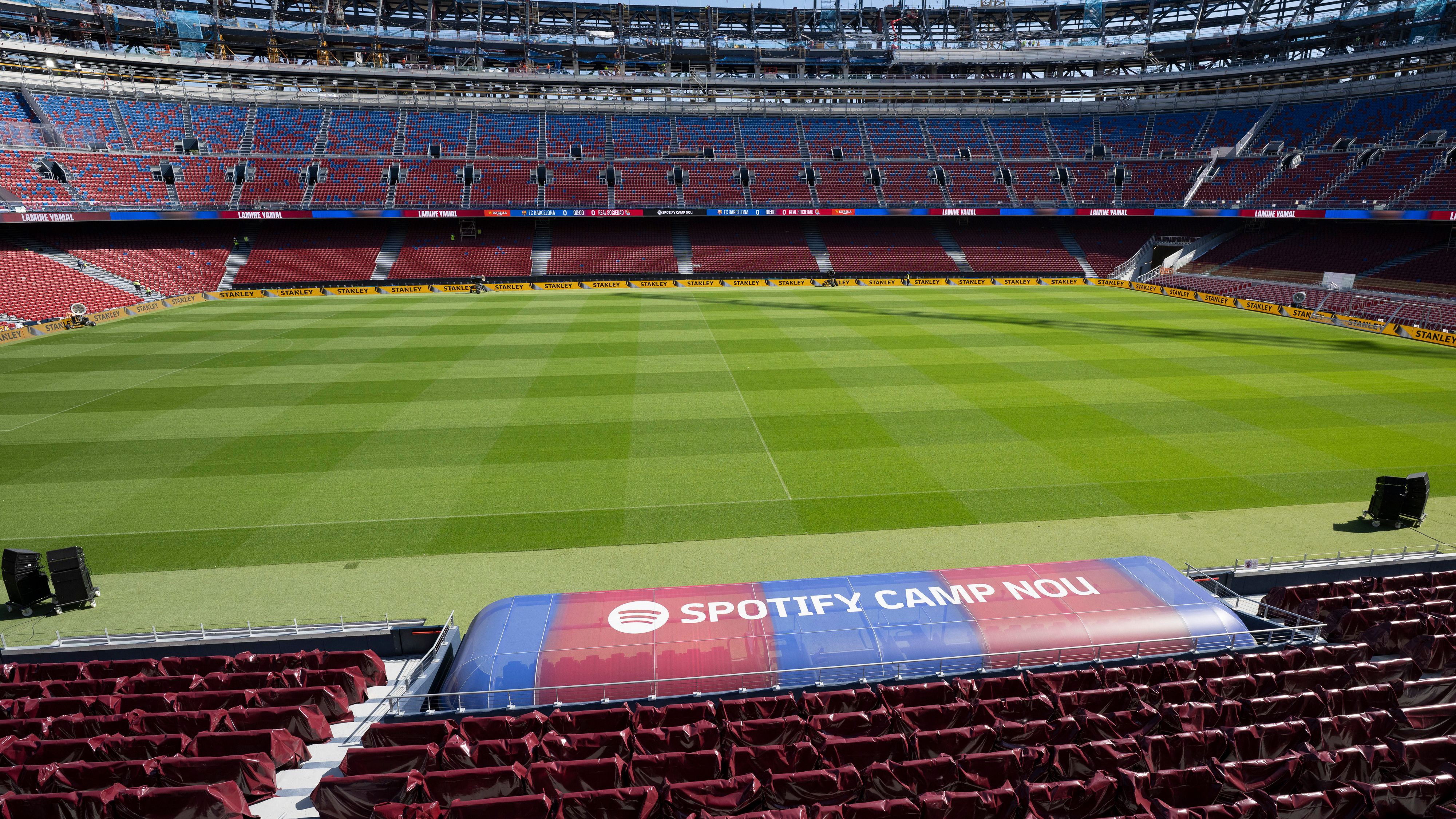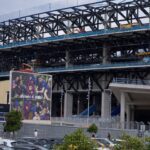


Unveiling the Turmoil: Workers’ Rights Clash at Barcelona’s Iconic Camp Nou
In the heart of Barcelona, growing conflicts are emerging around the Camp Nou redevelopment, spotlighting serious allegations of labor injustices. This upheaval underscores the urgent need for ethical oversight in major infrastructure projects, as workers demand fair treatment amid fears of deportation for nearly 50 non-citizen employees.
The Rising Worker Demonstrations at Camp Nou
On a recent Tuesday, a significant group of construction laborers assembled outside the stadium, voicing strong objections to the purported termination and impending removal of approximately 50 migrant staff members who were employed without proper documentation. Spearheaded by Spain’s CCOO labor organization, the action targeted contractors Limak and Ekstreme Works, alleging efforts to repatriate these individuals lacking adequate safeguards. A key union spokesperson, Carlos del Barrio, emphasized the harsh realities faced by these workers, noting in an interview with EFE that many have labored through extended shifts, such as 12 hours daily for over a year without respite.
Details of Unfair Dismissal and Vulnerabilities
The union reports that these employees, lacking legal work permits, are facing abrupt job loss without proper severance or support. Del Barrio highlighted the risks, explaining that once these workers return to their home countries-like Turkey-their opportunities for seeking justice would be severely limited, leaving them exposed and defenseless.
Calls for Immediate Action from Authorities
Del Barrio pressed for involvement from both the club and governmental bodies, advocating for Spain to implement swift immigration reforms and guarantee that all impacted workers gain proper Social Security enrollment. This push aims to protect vulnerable laborers and rectify ongoing irregularities in the project’s workforce management.
Barcelona’s Alleged Oversight and Past Criticisms
The CCOO has charged Barcelona with disregarding multiple requests to tackle these labor concerns, with Del Barrio informing journalists that the matter was already escalated to the Labour Inspectorate. He accused the club of ignoring these pleas, stating, “Though there’s immense urgency to launch the stadium, we must not sacrifice employee welfare in the process.” Meanwhile, the team has not released any formal response, but this incident compounds earlier backlash against the Espai Barca initiative. Back in 2023, similar complaints about improper labor standards arose, which the club claimed were being addressed, while their partner Limak has encountered prior investigations related to labor and ecological issues in Turkey, amplifying doubts about the overall handling of the Camp Nou transformation.
Timing and Potential Repercussions on Stadium Reopening
This wave of protests arrives at a critical moment for Barcelona, as the Camp Nou’s grand reopening looms just weeks away. The renovation efforts have been marred by numerous postponements and budget excesses, currently lagging 317 days behind as reported in mid-October 2025. The union’s assertions are prompting deeper scrutiny of how contractors are supervised and the club’s moral obligations in these matters. Earlier, institutional vice-president Elena Fort referenced “small irregularities” in labor protocols but rejected notions of widespread violations.
Critics’ Perspectives on Unresolved Matters
Opponents maintain that the recent rally demonstrates that these problems persist, potentially tarnishing Barcelona’s international standing right as they gear up to greet supporters back at this legendary venue.
Upcoming Events and Potential Disruptions
Barcelona is slated to resume activities at what is now called Spotify Camp Nou on November 22, hosting a La Liga match against Athletic Club. Leading up to that, the team has planned an open training event at the stadium this Friday, anticipating around 23,000 attendees as a key trial run. Yet, the ongoing labor conflict might interfere with these arrangements; if contractors pause operations or neglect compliance standards, additional setbacks to the launch could ensue.
The Shadow Over Barcelona’s Return
The club’s vision for a triumphant reentry to Camp Nou has been hampered by a series of obstacles, from scheduling slip-ups to operational hurdles, with this current dispute threatening to eclipse the excitement of the highly anticipated revival.
Looking Ahead: Negotiations and Balance of Priorities
At present, attention is focused on the outcomes of union discussions and official interventions, as Barcelona strives to advance the Espai Barca project while addressing the intensifying demands for equity among its workforce.
Understanding the Protests at Barcelona
Background on the Workers’ Protests
The ongoing workers’ protests at Barcelona have brought to light serious concerns about labor rights and immigration policies, especially as they intersect with major events like the Camp Nou reopening. Nearly 50 foreign employees, many of whom have been integral to the club’s operations, face potential deportation amid what critics call lax oversight from FC Barcelona’s management. This situation has sparked widespread outrage, with protestors accusing the club of prioritizing sold-out events over the livelihoods of its international workforce.
In recent months, these protests have gained traction on social media and in local media outlets, highlighting how Barcelona workers’ deportation issues could set a precedent for other sports organizations. Key figures in the protests include janitorial staff, maintenance workers, and even some security personnel from countries like Spain’s neighboring EU nations and beyond. The crux of the matter revolves around alleged visa complications and the club’s failure to advocate for these employees, which has fueled accusations of ignoring workers’ rights amid the hype around Camp Nou’s sold-out reopening.
What Sparked the Potential Deportation of Foreign Employees
Several factors have contributed to the potential deportation of nearly 50 Barcelona workers, creating a ripple effect in the broader conversation about foreign employee protections in sports. According to reports from labor advocates, many of these employees were hired on temporary visas that expired without proper renewal processes in place.
- Visa and Employment Challenges: Many foreign workers reported that their visas were tied to specific contracts, and changes in Barcelona’s internal policies led to non-renewal. This has raised questions about the club’s compliance with international labor laws, particularly for roles in stadium maintenance and event preparation ahead of the Camp Nou reopening.
- Economic Pressures Post-Pandemic: The global economic fallout from the pandemic has exacerbated job insecurity for foreign employees at Barcelona. With the club focusing resources on high-profile events like the sold-out Camp Nou games, critics argue that worker support has been sidelined, leading to protests over deportation threats.
- Lack of Club Support: Protestors claim that FC Barcelona has not intervened effectively with authorities to address deportation risks, despite having the influence to do so. This perceived inaction has amplified calls for better workers’ protests responses from sports giants.
The protests have also shed light on the human side of these issues, with stories emerging of families uprooted and careers interrupted. For instance, workers involved in the Camp Nou preparations have shared how the threat of deportation has added stress to their daily lives, even as the stadium gears up for its much-anticipated sold-out reopening events.
The Impact on Camp Nou’s Sold-Out Reopening
As Barcelona gears up for the Camp Nou reopening, the workers’ protests have cast a shadow over what should be a celebratory milestone for fans and the club. The stadium’s reopening, expected to draw thousands for sold-out matches and tours, represents a significant economic boost, but it’s now intertwined with deportation controversies.
How Events Are Affected
The protests have led to occasional disruptions, such as delayed preparations and public demonstrations outside the venue. Organizers are navigating a fine line between ensuring smooth operations for the sold-out reopening and addressing the accusations of ignoring workers’ protests.
- Security and Operational Risks: With nearly 50 foreign employees potentially facing deportation, there’s concern about staffing shortages that could impact security at Camp Nou events. This has prompted discussions on how Barcelona must balance event logistics with employee welfare.
- Fan and Public Reactions: Social media buzz around Barcelona workers’ deportation has influenced fan sentiment, with some boycotting ticket sales in solidarity. This adds a layer of complexity to the sold-out reopening, as public perception could affect the club’s long-term brand.
Accusations of Ignoring Workers’ Rights
FC Barcelona has faced mounting accusations of ignoring workers’ protests, with critics pointing to a pattern of prioritizing commercial success over ethical responsibilities. The club’s silence on the deportation of foreign employees has been particularly contentious, especially as it contrasts with its public image as a socially conscious organization.
Club’s Response and Accountability
In addressing these accusations, Barcelona has issued statements emphasizing compliance with legal requirements, but many view this as insufficient. For example, the club could collaborate more actively with immigration authorities to prevent deportations.
- Calls for Policy Changes: Advocates are pushing for Barcelona to implement better immigration support programs, such as expedited visa renewals for essential workers involved in Camp Nou operations.
- Broader Implications: This scenario highlights how workers’ protests in sports can influence corporate accountability, urging other clubs to examine their own practices regarding foreign employee protections.
The workers’ protests and potential deportations underscore the need for sustainable solutions in the sports industry, potentially inspiring reforms that extend beyond Barcelona.
Legal and Ethical Considerations
From a legal standpoint, the protests raise questions about the enforcement of labor laws in high-stakes environments like professional sports. Barcelona’s handling of foreign employees’ deportation risks could lead to legal challenges, emphasizing the importance of ethical practices.
Key Legal Aspects
Understanding the deportation process involves navigating complex immigration rules, which vary by country and employment type.
- Immigration Compliance Tips: For organizations like Barcelona, ensuring workers’ visas are up-to-date is crucial. This includes providing resources for renewals and advocating during protests to avoid deportation pitfalls.
- Ethical Business Practices: Clubs should adopt policies that protect foreign employees, integrating workers’ rights into their core values to prevent future accusations.
In summary of these elements, the Barcelona workers’ protests serve as a wake-up call for the sports world, blending urgency with opportunities for positive change in how foreign employees are treated ahead of major events like the Camp Nou reopening. (Word count: 752)









